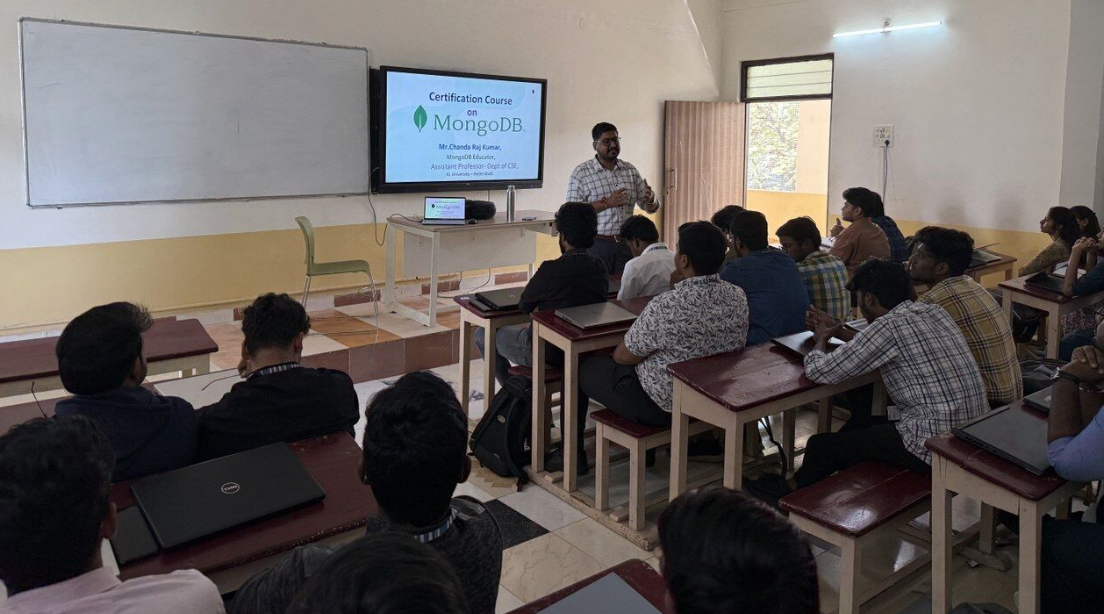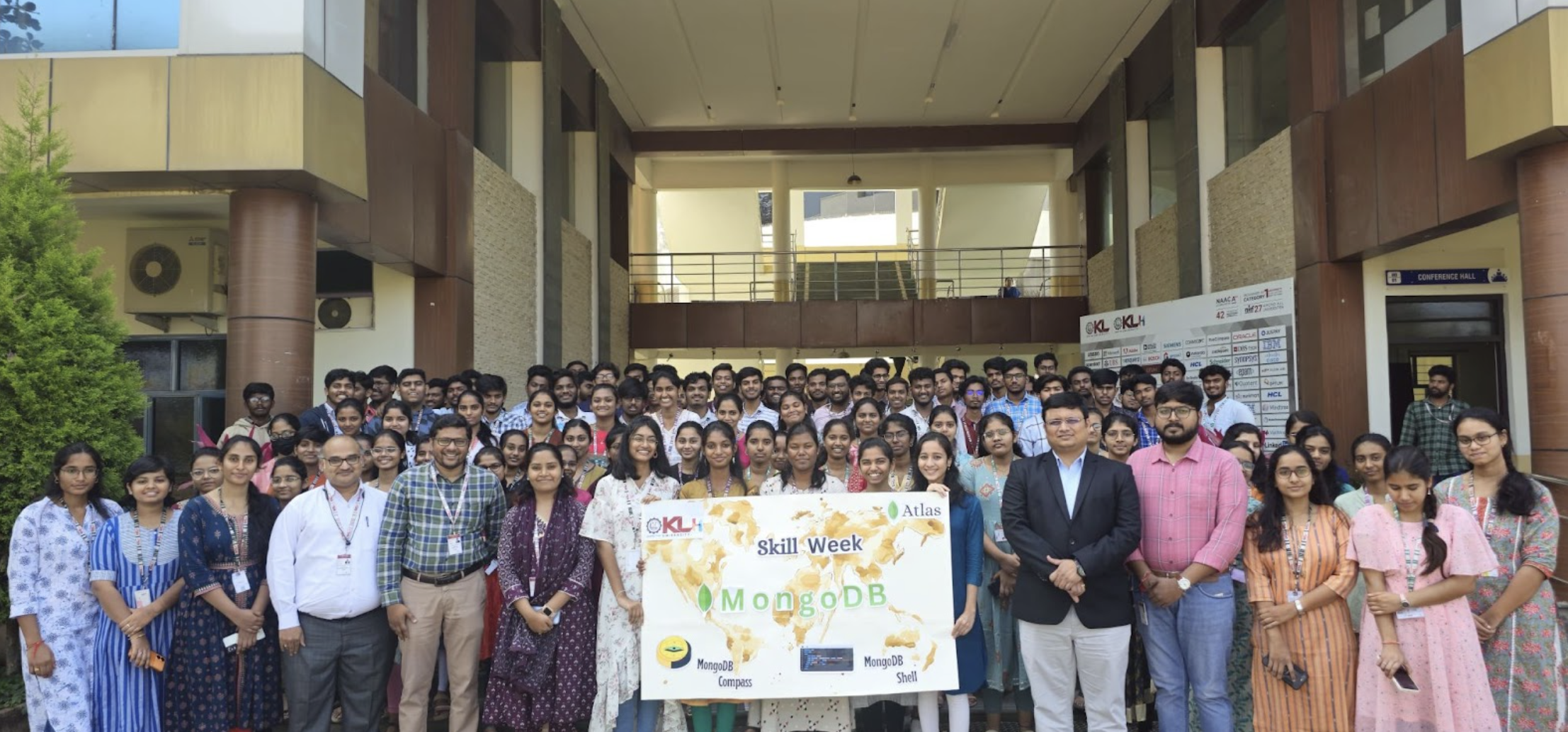Welcome to the second edition of our series highlighting how educators and students worldwide are using MongoDB to transform learning. In this post, we chat with Professor Chanda Raj Kumar of KL University Hyderabad.
The MongoDB for Educators program provides free resources like curriculum materials, MongoDB Atlas credits, certifications, and access to a global community of more than 700 universities—helping educators teach practical database skills and inspire future tech talent.
Applied learning: Using MongoDB in real-world teaching
Chanda Raj Kumar, Assistant Professor at KLEF Deemed to be University, Hyderabad, India, is a MongoDB Educator and Leader of the MongoDB User Group—Hyderabad. With ten years of teaching experience, he empowers students to gain hands-on experience with MongoDB in their projects. Thanks to his mentorship, during last semester’s Skill Week, 80% of his students earned MongoDB certifications, preparing them for careers in tech. His dedication earned him the 2024 Distinguished Mentor Award from MongoDB.
His story shows how educators can use MongoDB to inspire students and prepare them for careers in tech.

Tell us about your educational and professional journey and what initially sparked your interest in databases and MongoDB.
My educational journey consists of an undergraduate degree from Kakatiya University. Following that, I pursued an M.Tech from Osmania University, where I gained immense knowledge in the landscape of computer science, which aided in laying a strong foundation for my technical expertise. Currently, I am pursuing a PhD from Annamalai University, focusing my research on machine learning. Additionally, qualifying exams like UGC NET and TSET have further strengthened my understanding of databases and why they are a core aspect of developing an application. Over the past ten years, I have gained extensive experience in academia and industry, and I currently serve as an Assistant Professor at KL University, Hyderabad.
My interest in databases stems from their universal presence in almost every application. Early on, when I first dabbled into the world of databases, I was intrigued by how efficient storage mechanisms severely impact the speed and accuracy of data retrieval and other operations that will be performed on data through our application. While working with relational databases, I encountered challenges related to fixed schemas—certain data insertions were not feasible due to strict structural constraints or the unavailability of data types corresponding to spatial and vectorial data. This led me to delve into MongoDB, where the flexible JSON-based document structure provided a more scalable and dynamic approach to data management, along with MongoDB Atlas conforming to the rapidly evolving cloud computing of today's time.

What courses related to databases and MongoDB are you currently teaching?
At my university, I teach database-related courses across different levels. As a core course, I teach Database Management Systems (DBMS), covering database fundamentals and operations. I also handle Python Full Stack, MERN Stack, and Java Full Stack Development, integrating MongoDB with modern frameworks. Additionally, I conduct MongoDB certification courses, helping students gain industry-standard knowledge in database technologies.
What motivated you to incorporate MongoDB into your curriculum?
My journey with databases began when I realized the challenges of relational databases like SQL, with their rigid schema and complex queries. This led me to explore MongoDB, which offers a more flexible, user-friendly approach to data management.
I actively advocate for adding MongoDB to the college curriculum to prepare students for the growing demand for NoSQL technologies. By teaching MongoDB alongside relational databases, I aim to help students build practical skills to design and manage modern, dynamic applications.
You have successfully built an active student community around MongoDB on your campus. Can you share some insights into how you achieved this and the impact it's had on students?
Building an active student community around MongoDB on campus has not only been an exciting journey, but a very enlightening one as well. I had concentrated on a step-by-step teaching approach, beginning with the basics and slowly making my way up to more complex topics. This helped students build a strong foundation while feeling confident and thorough about the things they were learning.
One of the main ways I involved students was by incorporating MongoDB into different courses, where they could work on hands-on projects that required using the database. I also encouraged students to earn certifications like Developer and DBA, which gave them valuable credentials and a nod to their MongoDB skills. Furthermore, I arranged group discussions where students brainstormed, solved problems together, and stayed actively engaged in their learning. On top of that, I held special training sessions each semester called “Skill Weeks” that lasted a week to make sure that everyone was aware of the ongoing MongoDB advancements while also teaching newcomers.

How do you design your course content to integrate MongoDB in a way that engages students and ensures practical learning experiences?
I often begin by building a strong foundation, going over fundamental concepts such as document-oriented storage, collections, indexing, and CRUD operations to ensure students grasp the essentials. Once a solid base has been established, I introduce advanced concepts like aggregation pipelines, indexing, query optimization techniques, and sharding, whilst putting utmost emphasis on hands-on learning with real datasets to further fortify understanding. I also incorporate real-world projects where students design and build complete applications that integrate MongoDB in the backend and thereby, simulate industry use cases to enhance their problem-solving in a professional environment. As for the certification component, I include model quizzes, practice tests, and assignments to evaluate their knowledge and ensure they are job-ready with a validated skill set.
How has MongoDB supported you in enhancing your teaching methodologies and upskilling your students?
The curated learning paths and comprehensive resources through MongoDB Academia, such as PowerPoint presentations for educators, have best supported me and my teaching methods. The platform offers a wide variety of materials, covering basic to advanced concepts, often accompanied by visual aids that make complex concepts easier to grasp. The learning paths also provide a set of practice questions for the students that can reinforce their understanding. Moreover, the availability of the Atlas free cluster allows students to experiment with real-world database operations without cost, providing a practical experience. These resources offered by MongoDB have significantly reshaped my pedagogy to better accommodate practical elements.
Have you conducted any projects or studies on students' experiences with MongoDB? If so, what key insights have you discovered, and how can they benefit other educators?
Through surveys, Q&A sessions, and project reviews, I have identified students' strengths and weaknesses in working with MongoDB. Many students find the document-oriented model intuitive and appreciate the flexibility of schema design, but often struggle with optimizing queries, indexing strategies, and understanding aggregation pipelines. These insights have helped me refine and iterate my teaching style by focusing more on demonstrations, interactive exercises, and explanations targeted at complex topics. Other educators can benefit from these conclusions I have arrived at by incorporating regular feedback sessions and adapting their teaching methods to address these loopholes.
Could you share a memorable experience or success story of a project from your time teaching MongoDB that stands out to you?
One of the most memorable experiences from my time teaching MongoDB was during Skill Week, where 80% of my students earned MongoDB certifications. The structured pedagogy I implemented—combining hands-on learning, real-world projects, and guided problem-solving—played a crucial role in their success. This success was further recognized when I received an award last semester for my contributions to MongoDB education, further proving the impact of my teaching approach. Seeing students excel, gain industry-recognized skills, and confidently apply MongoDB skills in their careers has been incredibly rewarding for me.
How has your role as a MongoDB Educator impacted your professional growth and the growth of the student community at your university?
I have been able to demonstrate the power of non-relational databases, breaking the initial stigma about NoSQL databases and helping students see the advantages of flexible, scalable data models. This journey has also helped me secure my position as a subject matter expert, allowing me to lead discussions on advanced database concepts and real-world applications. As a MongoDB User Group (MUG) leader, I have built a global network, collaborating with educators, developers, and industry professionals. Additionally, conducting mentoring workshops at other colleges has strengthened my leadership skills while expanding MongoDB awareness beyond the scope of my institution. Most importantly, this role has provided students with direct industry exposure, which I believe plays a pivotal role in the growth of their careers.
What advice would you give to educators who are considering integrating MongoDB into their courses to ensure a successful and impactful learning experience for students?
My advice is to build upon students’ pre-existing knowledge while gradually introducing the transition or shift to NoSQL concepts. Since most students start with relational databases, it’s important to first highlight the key differences between SQL and NoSQL, and to explain when to use each. Given that students are generally inclined toward SQL (as it’s often the first database they work with), introducing MongoDB as a schema-less, document-oriented database makes the transition smoother. Once the basics are covered, progressing to advanced topics like data modeling, aggregation pipelines, and indexing ensures students gain a deeper understanding of database optimization and performance tuning. By adopting this structured approach, educators can provide a comprehensive, real-world learning experience that prepares students for industry use cases.
To learn more, apply to the MongoDB for Educators program and explore free resources for educators crafted by MongoDB experts to prepare learners with in-demand database skills and knowledge.